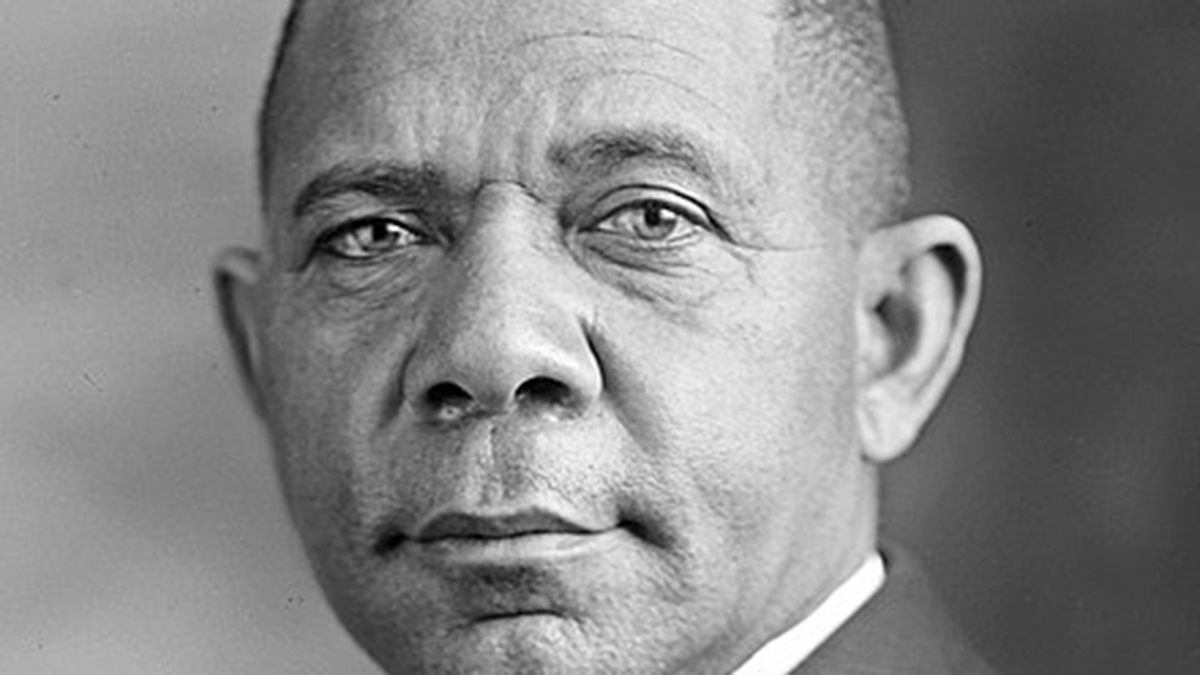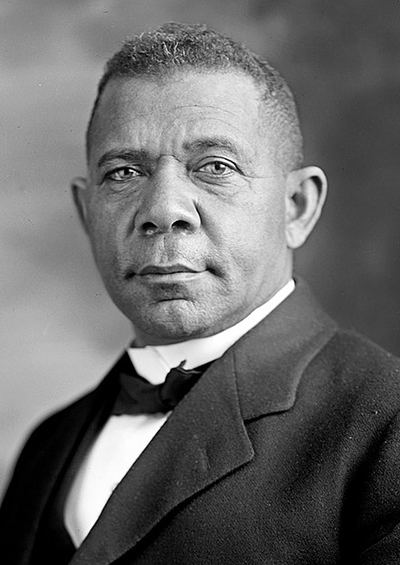Mississippi Today
On this day in 1856

On this day in 1856
APRIL 5, 1856

Booker T. Washington was born in Virginia. He became a leading voice from the last generation of Black leaders who had once been enslaved. He promoted Black businesses and helped found the Tuskegee Institute in Alabama.
While lynchings were rampant across the South, he delivered an 1895 speech known as the “Atlanta Compromise,” calling for Black progress through education and entrepreneurship, rather than challenging the Jim Crow system that barred Black Americans from equal citizenship.
“The wisest among my race understand that the agitation of questions of social equality is the extremist folly,” he said.
His speech gained him support from white leaders but criticism from a number of Black leaders, including W. E. B. Du Bois, who believed protests were a vital way to change the Jim Crow system. Six years later, he released his autobiography, “Up From Slavery”, which became a best-seller and remained the most popular Black biography until “The Autobiography of Malcolm X” was released in 1965.
In his book, Washington recalled the day his family was set free: “After the reading (of the Emancipation Proclamation), we were told that we were all free, and could go when and where we pleased. My mother, who was standing by my side, leaned over and kissed her children, while tears of joy ran down her cheeks. She explained to us what it all meant, that this was the day for which she had been so long praying, but fearing that she would never live to see.”
In 1915, he died on the campus of Tuskegee and was buried there. In the decades that followed, he continued to be honored — with a postage stamp, a coin, a liberty ship bearing his name and his childhood home, which was declared a national monument.
This article first appeared on Mississippi Today and is republished here under a Creative Commons license.
Did you miss our previous article…
https://www.biloxinewsevents.com/ballot-initiative-death-coming-soon-to-a-campaign-ad-near-you/
Mississippi Today
Lawmakers negotiate Medicaid expansion behind closed doors, hit impasse on state budget
House and Senate Republicans continued to haggle over Medicaid expansion proposals Sunday, and the state budget process hit a snag after leaders couldn't reach final agreements by a Saturday night deadline on how to spend $7 billion.
House Speaker Jason White on Sunday told his chamber that Medicaid expansion negotiators from the House and Senate had been meeting and he expected a compromise “will be filed by Monday or Tuesday at the latest.”
House Medicaid Chairwoman Missy McGee said the Senate had delivered another counter proposal on expansion Sunday evening but declined to provide details. Her Senate counterpart, Medicaid Chairman Kevin Blackwell, declined comment on Sunday. The two leaders met in McGee's office on Sunday evening following a Saturday afternoon meeting.
READ MORE: House, Senate close in on Medicaid expansion agreement
Lawmakers have for the past couple of months been debating on how to expand Medicaid coverage for poor Mississippians and help the state's flagging hospitals. The House initially voted to expand coverage to an estimated 200,000 people, and accept more that $1 billion a year in federal dollars to cover the cost, as most other states have done. The Senate initially passed a far more austere plan, that would cover about 40,000 people, and would decline the extra federal money to cover costs.
Since those plans passed, each has offered counter proposals, but no deal has been reached.
A group of about 50 clergy, physicians and other citizens who support full expansion showed up at the Capitol on Sunday to sit in the Senate gallery and deliver letters to key leaders who are negotiating a final plan.
“When we stand before the Lord, he's not going to ask how much money did you save the state. He's going to ask you what you did for the least of these,” Monsignor Elvin Sounds, a retired Catholic priest, said outside the Senate gallery on Sunday.
READ MORE: A solution to the Republican impasse on Medicaid expansion
Lawmakers hit an impasse on setting a $7 billion state budget and missed Saturday night's deadline for filing appropriations bills. This will force the legislature into extra innings, and require lawmakers to vote to push back deadlines. Lawmakers had expected to end this year's session and leave Jackson by early this week. But House Speaker Jason White told his chamber on Sunday they should expect to continue working through Friday, “and possibly through Saturday or Sunday.
White later said of the budget impasse, “When you get to haggling over spending $7 billion, folks are going to have disagreements.”
Lt. Gov. Delbert Hosemann, who presides over the Senate, said “things are fluid. But everybody is working.”
He looked at his watch and said “It is 5 o'clock. By 6 o'clock what I tell you will have changed.”
White said one reason for the session having to run extra innings is that when he became speaker he vowed to House members that he would not continue the practice of passing much of the state budget last-minute, late at night or in the wee hours of the morning with little or no time for lawmakers to read or vet what they are passing.
He said the House was prepared early Saturday night to file budget bills with agreed-upon numbers, but not to file “dummy bills” with zeros or blanks and continue haggling a budget late into the night.
“I made a promise that we are not going to keep them up here until midnight, then plow through all these budget bills,” White said. “We had had a gentleman's agreement (between the House and Senate) earlier in the session to negotiate a budget by April 15. That didn't happen … We are not going to do everything last minute with no time for our members to read things and ask questions. We are not going to do it in the middle of the night.”
READ MORE: Senate negotiators a no-show for second meeting with House on Medicaid expansion
This article first appeared on Mississippi Today and is republished here under a Creative Commons license.
Mississippi Today
On this day in 1951


April 28, 1951

Ruby Hurley opened the first permanent office of the NAACP in the South.
Her introduction to civil rights activism began when she helped organize Marian Anderson's 1939 concert at the Lincoln Memorial. Four years later, she became national youth secretary for the NAACP. In 1951, she opened the organization's office in Birmingham to grow memberships in Alabama, Florida, Georgia, Mississippi and Tennessee.
When she arrived in Mississippi, there were only 800 NAACP members. After the governor made remarks she disagreed with, she wrote a letter to the editor that was published in a Mississippi newspaper. After that step in courage, membership grew to 4,000.
“They were surprised and glad to find someone to challenge the governor,” she told the Chicago Defender. “No Negro had ever challenged the governor before.”
She helped Medgar Evers investigate the 1955 murder of Emmett Till and other violence against Black Americans. Despite threats, she pushed on.
“When you're in the middle of these situations, there's no room for fear,” she said. “If you have fear in your heart or mind, you can't do a good job.”
After an all-white jury acquitted Till's killers, she appeared on the front cover of Jet magazine with the headline, “Most Militant Negro Woman in the South.”
Months later, she helped Autherine Lucy become the first Black student at the University of Alabama.
For her work, she received many threats, including a bombing attempt on her home. She opened an NAACP office in Atlanta, where she served as a mentor for civil rights leader Vernon Jordan, with whom she worked extensively and who went on to serve as an adviser to President Bill Clinton.
After learning of Evers' assassination in 1963, she became overwhelmed with sorrow. “I cried for three hours,” she said. “I shall always remember that pool of blood in which he lay and that spattered blood over the car where he tried to drag himself into the house.”
She died two years after retiring from the NAACP in 1978, and the U.S. Post Office recognized her work in the Civil Rights Pioneers stamp series. In 2022, she was portrayed in the ABC miniseries, “Women of the Movement.”
This article first appeared on Mississippi Today and is republished here under a Creative Commons license.
Mississippi Today
Rare open negotiations occur on important Medicaid expansion issue
The curtain was pulled back last week for the first time in years on the Mississippi Legislature's often mysterious conferencing process.
A conference committee consists of three representatives and three senators appointed to try to reach agreement when the two chambers pass differing versions of the same bill. Last week, a conference committee formed to try to reach agreement on Medicaid expansion caused a stir by meeting in a public setting.
Even though the joint rules of the Mississippi Legislature call for an open conferencing process, the conferees seldom meet in public. They usually meet and negotiate their differences near the end of the session behind closed doors.
That was not always the case.
For a period in the late 1990s and early 2000s, the Legislature, under intense pressure from the Mississippi Press Association, made open conference committees the norm.
Some major issues have been played out in public conference committees. Notable open conferences include:
- The infamous, excruciatingly long special session in 2002 where businesses received more protection from lawsuits.
- Budget fights when Haley Barbour was governor when legislators often would reach an impasse in the negotiations process and spend the bulk of their time talking about their cars and eating candy.
- The major rewrite of the state's economic development package under then-Gov. Ronnie Musgrove called Advantage Mississippi.
- The Mississippi Adequate Education Program, which for decades has provided the state's share for the basic operation of local school districts. It was hammered out in an open conference process in 1997 even before the joint rules mandated the open process.
Then-state Sen. Musgrove and former House Speaker Billy McCoy deserve credit or blame, according to one's perspective, for proving the open conference process could work. When they chaired their respective chamber's education committees, they insisted on having an open conference process.
But in more recent years, open conference committees have been few and far between. The joint rule has been largely ignored.
The fact that the three House and three Senate conferees agreed to meet at least once in public on Medicaid expansion — one of the most pivotal issues facing the Legislature in recent years — drew considerable attention.
If nothing else, the open conference committee provided a raw and unedited view of how far apart the two chambers were at the time on an issue that would provide additional health care coverage to primarily the working poor.
The House wanted to provide coverage to those earning up to 138% of the federal poverty level, or about $20,000 annually for an individual, while the Senate had proposed providing coverage to those earning less than 100% of the federal poverty level, or about $15,000 per year.
According to various experts, the House plan would provide coverage to many more working Mississippians and cost less to the state than would the Senate plan. The reason for the lower cost to the state is that when expanding to 138%, the federal government will pay 90% of the costs and provide the state an additional roughly $700 million over two years as an enticement to expand.
Under the Senate plan, the federal government will pay 77% of the cost and offer no incentives. It is important to understand that in the expensive world of health care, the difference in 77% of the cost and 90% means tens of millions to Mississippi state coffers.
The House conferees repeatedly pointed out those numbers — their plan covering more at less cost — during last week's open conference committee.
One of the reasons legislators through the years have not been enamored with an open conference process is that it has often turned into efforts by the negotiators to sell their position to the public.
Once the open conference process starts, the side that feels the most comfortable with its position wants to meet more often in full view of the public to make sure the public understands where each side stands.
For whatever it is worth, the House conferees were more enthusiastic about continuing the open process after the initial Medicaid expansion conference committee.
And after that initial open conference, the Senate offered a compromise to cover those earning up to 138% of the federal poverty level — just as the House proposed.
This article first appeared on Mississippi Today and is republished here under a Creative Commons license.
-
Local News4 days ago
Sister of Mississippi man who died after police pulled him from car rejects lawsuit settlement
-
Mississippi Today4 days ago
At Lake High School in Scott County, the Un-Team will never be forgotten
-
Mississippi Today24 hours ago
On this day in 1951
-
Mississippi News2 days ago
One injured in Mississippi officer-involved shooting after chase
-
Mississippi News7 days ago
Cicadas expected to takeover north Mississippi counties soon
-
Mississippi News6 days ago
Viewers make allegations against Hatley teacher, school district releases statement – Home – WCBI TV
-
Mississippi News Video5 days ago
Vehicle struck and killed man lying in the road, Alcorn County sheriff says
-
Mississippi News4 days ago
Ridgeland man sentenced for molesting girl



































